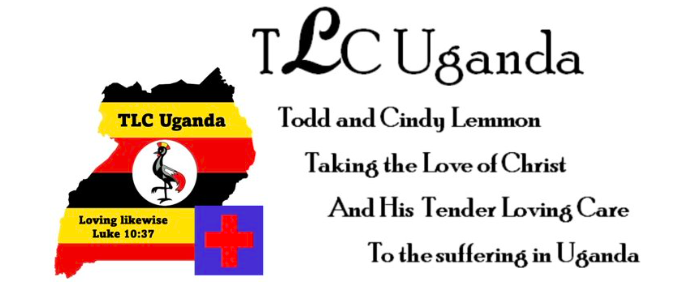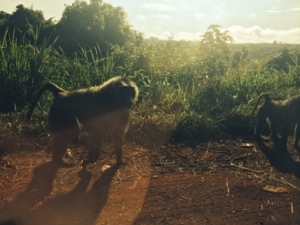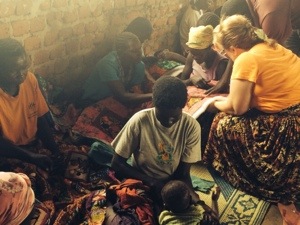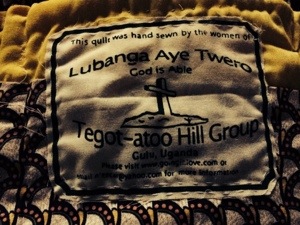Day Ten, April 24:
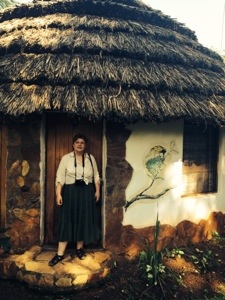 Last night it rained through the night and the coolness swept through the room. I don't think I could have been more comfortable. We woke to a symphony of birds: doves cooing so that I mistook them for owls at first, hundreds of sweet chirping things, and the exact replication of the "tookie bird" from the kids' Disney read-along books, "ahh ahh eee eee tookie tookie!" What I didn't hear was a large black annoyingly loud Ibis-looking bird we have seen and heard everywhere we have been, but a walk after breakfast would prove he was here. He apparently was busy collecting bugs with his long straw beak in the mud softened by the rain. I still haven't heard any of his obnoxious "caw cawwing" today. Speaking of birds, yesterday the eagles were swooping down at the roadway, taking advantage of the easy hunting backdrop when critters ventured to cross. Anthony had told us their talons can scratch automotive windshields, so he was nervous about them swooping too near the car. They were beautiful golden brown, much like our Golden Eagle.
Last night it rained through the night and the coolness swept through the room. I don't think I could have been more comfortable. We woke to a symphony of birds: doves cooing so that I mistook them for owls at first, hundreds of sweet chirping things, and the exact replication of the "tookie bird" from the kids' Disney read-along books, "ahh ahh eee eee tookie tookie!" What I didn't hear was a large black annoyingly loud Ibis-looking bird we have seen and heard everywhere we have been, but a walk after breakfast would prove he was here. He apparently was busy collecting bugs with his long straw beak in the mud softened by the rain. I still haven't heard any of his obnoxious "caw cawwing" today. Speaking of birds, yesterday the eagles were swooping down at the roadway, taking advantage of the easy hunting backdrop when critters ventured to cross. Anthony had told us their talons can scratch automotive windshields, so he was nervous about them swooping too near the car. They were beautiful golden brown, much like our Golden Eagle.
The breakfast buffet here at Kingfisher was set with grains, fruits, teas, fresh whole milk, and an omelette bar attended upon request with beautiful brown eggs from nearby chickens. It was great, and we topped it off with a mango and some raw G-nuts we had in our room, a gift from Nancy Cordoza, that reminded us we were in Uganda and not California. Thanks again, Nancy!
Marcia Baugh, our point of contact with The Way Home ministry, told me she and her husband, Russ, would visit us at the resort this afternoon, so I gave Anthony the day off to spend with his family, and Cindy and I looked forward to enjoying our day of leisure at the Kingfisher Safaris Resort. There are boat tours offered here and I think we will take one.
We did our laundry last night and it is drying nicely on a cord I strung across our room. Cindy thought I was weird when I bought a length of 550 pound poly cord, but it has repeatedly proven very handy. As long as I'm talking about handy items for traveling to Africa, I must sound a recommendation for moist towelettes, quick-dry camp towels, zip-closure bags, alcohol gel (though the TSA made us leave most of it behind), travel-sized toilet tissue rolls, laundry detergent packs, and 3-M UltraThon 12-hour insect repellent. Thanks to those who recommended these things to us or supplied them, our travel has been much more enjoyable.
I read a passage in Acts in my devotional yesterday and I read it again today because I heard it speak to me:
"For so the LORD has commanded us,
'I have set you as a light to the Gentiles,
That you should be for salvation to the ends of the earth.'"
(Acts 13:47, NKJV; also Isaiah 49:6)
Later:
I spent the morning relaxing, snoozing, and reading the scores of emails I downloaded yesterday while connected to the hotel wi-fi. Internet connection is scarce in Uganda, and intermittent even at its best. I have had little opportunity to respond to correspondence, and calling home seems a mean thing to do until after 3pm, when it is 8am back home. I'm still not sure how much time my airtime cards allow since they are in Ugandan shillings rather than minutes, and hearing this cheap throw-down phone I bought is very difficult for me even with my hearing aids.
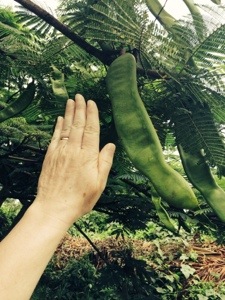 I booked our boat tour to the source of the Nile and we push off in half an hour. Cindy is shuffling the laundry on our homemade clothesline. Leisure doesn't come naturally for either of us, but Cindy for sure. We've wandered the beautiful gardens of this resort and found some very interesting and beautiful plants and animals. There is a Poinsettia tree here as tall as a house, and a strange bean-pod bearing tree with flat fern-like branches, the pods of which are as long as a forearm and quite wide. There are coconut trees and date palms, and pretty flowering mysterious things neither of us have seen before. The rain pushed some great big millipedes up out of the ground, and we were impressed to see how fast they move around.
I booked our boat tour to the source of the Nile and we push off in half an hour. Cindy is shuffling the laundry on our homemade clothesline. Leisure doesn't come naturally for either of us, but Cindy for sure. We've wandered the beautiful gardens of this resort and found some very interesting and beautiful plants and animals. There is a Poinsettia tree here as tall as a house, and a strange bean-pod bearing tree with flat fern-like branches, the pods of which are as long as a forearm and quite wide. There are coconut trees and date palms, and pretty flowering mysterious things neither of us have seen before. The rain pushed some great big millipedes up out of the ground, and we were impressed to see how fast they move around.
Still later:
 Our ride on the boat was beautiful! Franco, our captain, took us to where the Nile begins at the edge of Lake Victoria. He showed us many sights, including a monument to the first white man to "discover" the point, another park in honor of Ghandi, a hero in these parts, and a small island where the local tribe offers an annual sacrifice of two black goats to the demon of the lake. He told us the point used to be a waterfall, but since the hydroelectric dam was built downstream, the water has risen to just above the rocks. There was an island at the point, that was almost completely flooded over. The tour shops had water up to the base of them. It was quite a feeling being on such an ancient river, and being at the source of it.
Our ride on the boat was beautiful! Franco, our captain, took us to where the Nile begins at the edge of Lake Victoria. He showed us many sights, including a monument to the first white man to "discover" the point, another park in honor of Ghandi, a hero in these parts, and a small island where the local tribe offers an annual sacrifice of two black goats to the demon of the lake. He told us the point used to be a waterfall, but since the hydroelectric dam was built downstream, the water has risen to just above the rocks. There was an island at the point, that was almost completely flooded over. The tour shops had water up to the base of them. It was quite a feeling being on such an ancient river, and being at the source of it.
When we got back, we found messages from Marcia, canceling our afternoon meeting, so we went to lunch, resigned to spend the whole day at leisure. After a brief dip in the pool and a nap, it was just about time for supper. Today showed the first sign of any intestinal distress, so I kept the meal simple and vegetarian, as breakfast and lunch had been.
We heard from our Kampala contact, Gina Gant who, along with her husband Steve, will be hosting us Saturday through Tuesday, and sharing with us the ministry of Wells of Hope. I also heard from a missionary nurse who runs a camping ministry, but is stateside right now, Kindri Van Puffelen. She gave me a recommendation for a missionary guesthouse that would be closer to things on the other side of Jinja, so we decided to check out of the Kingfisher Safaris Resort and into the less costly Providence Guesthouse tomorrow. I am told proceeds of that guesthouse go to fund other mission ministries. Anthony will pick us up around 9am.
